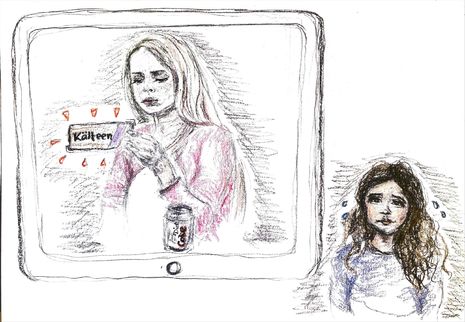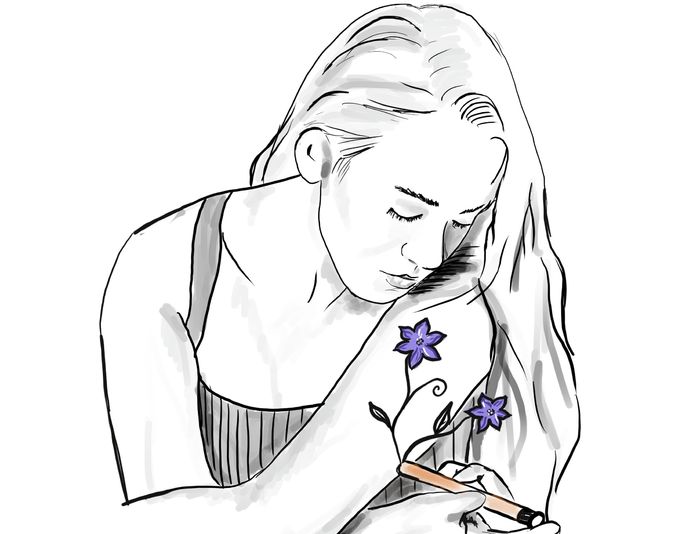From beginning to end: living with an eating disorder
Hannah Virji shares her experiences with an eating disorder as well as recovery during the pandemic

Content Notice: this article contains detailed discussion of eating disorders, including mentions of anorexia and binge eating
For many people, the first time you sleep away from your home occupies the first taste of independence, marking the beginning of the transition from childhood to adolescence. During my first sleepover, we followed the recipe for the perfect execution of such an event, laid out in Seventeen magazine spreads and chick flicks, to the letter. We painted our nails, braided each other’s hair, ate popcorn and watched all the teen classics.
Perhaps it isn’t surprising then that, as girls desperately trying to grow up, my classmates became aware of eating disorders at such a young age. How could you fail to, when the gorgeous Regina George in Mean Girls obsessively reads the back of food packaging? Or when Wild Child’s Drippy secretly binges on ice cream to console herself? Depictions of young women with unhealthy relationships with food are common, yet these movies rarely raise any concerns about eating disorders. Instead, disordered eating practices are often portrayed as part of being a woman.
“I began to consider what other people thought of me when they looked at my body”
“You look anorexic. Are you?”
I suspect that the girls who told me I “looked anorexic” believed that to be anorexic was just to be very thin. And although I’ve never dared to ask what they meant by it, I’d like to think that they just asked out of curiosity.
It was that night I began to consider what other people thought of me when they looked at my body. I’m sure I would have developed that insecurity eventually — body image concerns are just part of the territory for almost all young women, after all. But I know now that the reason I remember my first sleepover so vividly isn’t just because it was a picture-perfect teenage slumber party; it was also because of the destructive self-consciousness I developed.
That night the host’s mother pulled me aside and sat me down at the kitchen table, asking me if I was anorexic. I remember staring fixedly at a drawing pinned on the fridge, kicking my heels against the table as she reassured me that there was no shame if I was struggling with my eating. I denied everything — I may not have known what an eating disorder was, but I knew it was bad — before running away to the bathroom where I promptly burst into tears.
“The pandemic has had a unique way of focusing the mind entirely on the body”
As it happens, I wasn’t anorexic and I never have been. But the feeling of shame that I felt even at the suggestion persisted for the next ten years. Somewhat counterintuitively, I only stopped associating food with shame eighteen months ago when I was diagnosed with an ‘unspecified eating disorder.’ This diagnosis finally went some way towards defining an illness that had thrived precisely because I didn’t tell anyone about it. I would hide for days at a time in my room on only a single glass of water, typing out supervision essays through blurred vision. Once I’d finished, I would run to the fridge, endlessly eating vast quantities of pasta, bread or cheese; at my lowest point, I remember eating jam straight out of the jar, scooping it out with my fingers.
Binges are often characterised as a release of control after a period of restriction. For me, they were just another way of exerting control over my body. I would force myself to eat until I was far past the point of comfort and then force myself to exercise with a bloated stomach, restarting that binge-restrict cycle that defined my life at Cambridge for almost two years. Ironically, this cycle spiralled into my eating disorder, an illness that is the epitome of a total loss of control.
Recovery during a pandemic has had its moments: continued stigma surrounding eating disorders meant that I couldn’t tell my family about my eventual diagnosis or my treatment, reducing me to whispered conversations with a psychologist all while attempting to treat a mental illness with intensely physical symptoms over Zoom.
Despite the significant challenges, the pandemic has had a unique way of focusing the mind entirely on the body, and on what we value about our bodies. While freedom from the restrictive week-long essay cycles of Cambridge certainly helped in tackling my binge-restrict cycles, it was the very fact of existing and recovering during a pandemic that has altered my relationship with my body in more fundamental ways. It seems ludicrous to care about the so-called ‘maintenance’ of my appearance when the world is falling apart. There is value in ‘self-care’ (I still wear lipstick under a mask sometimes), but when your healthy body is your only defence against a potentially deadly virus, self-care starts to take on a different meaning. Taking care of myself is now about keeping my body well-nourished and strong and acknowledging that my health and my body are intrinsically connected to the health of all the bodies around me. It is not about exercising to shape my body to fit the latest trend women’s bodies have been subjected to.
When I finally return to Cambridge in October, I probably won’t be re-emerging as a new and improved version of myself. I haven’t obeyed the incessant headlines and ‘glowed up’. Perhaps the strangest thing about the past eighteen months is that, even though I’ve spent my entire year off focusing on recovery, there has been no drastic change. Ultimately, my recovery has crept up on me, unnoticed, just as my eating disorder did. One day I just woke up and realised that for the first time in ten years, my body no longer occupies all of my thoughts. And I can only hope that this transformative realisation lasts.
If you are affected by any of the issues raised in this article, the following organisations may provide support and resources:
- Beat provides helpful information and support. They offer a free confidential helpline and can be contacted via email
- Mind offers advice and support for those experiencing mental health problems
- For a more comprehensive list of support resources at the university, visit the Student Advice Service website
 News / SU reluctantly registers controversial women’s soc18 December 2025
News / SU reluctantly registers controversial women’s soc18 December 2025 Features / Should I stay or should I go? Cambridge students and alumni reflect on how their memories stay with them15 December 2025
Features / Should I stay or should I go? Cambridge students and alumni reflect on how their memories stay with them15 December 2025 News / Dons warn PM about Vet School closure16 December 2025
News / Dons warn PM about Vet School closure16 December 2025 News / Cambridge study finds students learn better with notes than AI13 December 2025
News / Cambridge study finds students learn better with notes than AI13 December 2025 News / Uni registers controversial new women’s society28 November 2025
News / Uni registers controversial new women’s society28 November 2025










